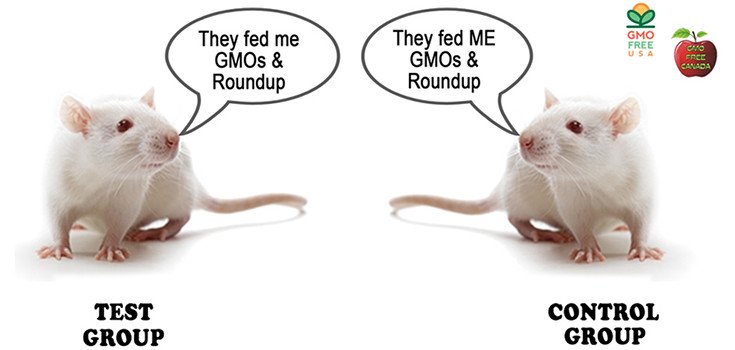Biotech Found to Use GM-Contaminated Rat Feed in Fraudulent Studies

Researchers have found that in some biotech study cases meant to measure the safety of Round Up crops, the rat feed given to rats in both the control group AND the testing group was contaminated with the same GMOs and pesticides (and heavy metals). In other words, laboratory rodent feeds are highly contaminated with pesticides, toxic metals, PCBs, and GMOs.
The study comes from researchers at the University of Caen in France and is slated to be published in the journal PLOS ONE.
This means the study proving the safety of ‘Round Up’ is essentially meaningless. Here’s why:
- Researchers analyzed 13 separate dried rodent chows produced on five continents, testing for traces of 4 heavy metals, 17 dioxins and furans, 18 PCBs, 22 GMOs and 262 pesticides.
- Every feed tested contained numerous toxins at levels high enough to cause disease by disrupting the endocrine and nervous systems.
- 11 of the 13 diets contained GMOs engineered to be resistant to the herbicide Round Up (glyphosate), while nine contained detectable levels of glyphosate itself.
- Since there was no feed that was not without these obvious contaminants, there was no way to make a comparison between rats fed on non-GM, non-toxic diets, as compared to diets full of contaminants that are linked to pathogenic results.
Read: Anonymous Scientists Say Their Work on GMOs is Suppressed
How can any regulatory agency truly expect the biotech industry to police itself with studies like this coming out?
Moreover, considering that Monsanto dedicates time to debunking ‘psuedo-science’ as they like to call it, or any scientists who claims that GM crops or the herbicides used to grow them are unsafe, you have to wonder how they can claim a study like this has any scientific merit whatsoever.

Well, I have to agree that studies without controls are usually worthless. In fact, I’ve seen it more often in the anti-GMO studies, so I would really like to see this study for myself. It’s interesting that it isn’t out yet, so we’ll have to wait and see if Christina’s description is correct or not.
Her track record for accuracy is less than stellar, and PLoS ONE does not have the best reputation for accuracy.
Yep, virtually every anti-GMO study I have read (which is quite a few) has methodological flaws. I can only think of one where I didn’t spot any obvious flaws. But when the weight of the overall literature was considered, I didn’t find that one study very compelling.
My favourite study was one where the group (I think it was Seralini’s) actually admitted that they didn’t even bother confirming if the control feed was actually non-GM.
Did you see this article??
momsacrossamerica.com/stunning_corn_comparison_gmo_versus_non_gmo
Did you read Zen Honeycutt’s article, “Stunning Corn Comparison: GMO versus NON GMO?”
Is it a primary research article published in a peer-reviewed journal? If not, no I haven’t.
I’ve worked in areas where lab mice are tested on and seen their feed. There’s nothing organic or non-GMO about it. I don’t need Natural Society to keep me informed on this one.
Well Bobo, I had my 2 cents on this! I don’t know about Seralini, but my fit with Factor GMO and talking with Anthony Samsel about it spurred him to do his own study.
Anthony Samsel Food Safety Research
gofundme.com/xrp4h9g
‘the people who are crazy enough to think they can change the world are the ones who do.’
Steve Jobs.